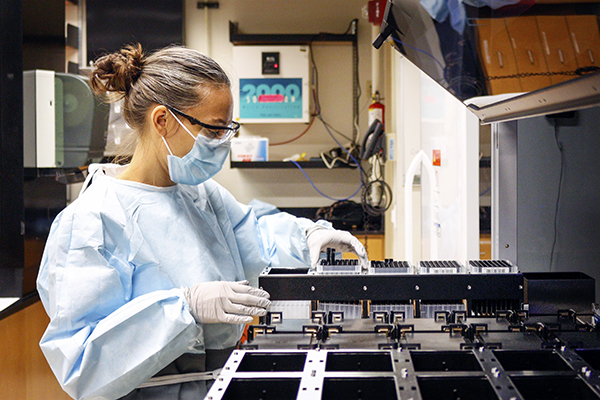University Health Services offers free COVID-19 testing for asymptomatic students, faculty and staff through the Proactive Community Testing Program, but individuals who test positive must get a second confirmatory test.
UT is actively pursuing clinical certification for the saliva test to streamline the COVID-19 testing process, but there is no clear timeline on when certification will be granted, program manager Michael Godwin said in an email.
Godwin said the proactive community testing saliva test needs to be confirmed with a nose swab because it has not yet been classified as a clinical test or a test that meets requirements set by the United States Food and Drug Administration.
“This two-step process creates a lag between the time an individual first gets tested and when they can receive a confirmatory result,” Godwin said. “So, a single ‘clinical’ saliva test would allow us to act at the level of an individual as soon as they get a positive result.”
For proactive community testing, UHS collects saliva samples by having people spit in a tube under the supervision of UHS staff. If a student tests positive, UHS will ask the student to do a confirmatory nose swab test at the 27th Street Garage, according to previous reporting by The Daily Texan.
Godwin said the saliva test is a viral polymerase chain reaction test. This process diagnoses active COVID-19 infection by looking for the genetic material of the virus in the sample and is highly accurate, according to the Food and Drug Administration.
Andreas Matouschek, director of the Center for Biomedical Research Support, said the regulations for a clinical test are outlined by the Clinical Laboratory Improvement Amendments. He said these are meant to ensure the quality of clinical tests by providing guidelines for documentation, training staff, test validation and quality control.
“A ‘clinical test’ is mostly a bureaucratic distinction,” Godwin said. “Our test is clinical quality, but we have to fulfill mostly administrative requirements to get the appropriate certification.”
Other universities have also used a saliva testing approach. The University of Illinois Urbana-Champaign tests all students and employees working at their facilities through a saliva test, according to ABC News. The university has conducted as many as 17,656 tests per day, according to their testing data.
UT has the capacity to test 5,000 students per week through proactive community testing, according to an Aug. 20 press release. Godwin said the University is averaging about 500 tests per day since Aug. 24.
Godwin said that of about 4,500 total proactive community testing tests, 1.7% have tested positive but not all have been confirmed by a nose swab test, and 0.50% have been inconclusive. An inconclusive test indicates a possible positive result but requires re-testing.
Godwin also said there is a 2% invalid sample rate, meaning the person was not properly hydrated or did not follow directions for the 30 minute fasting period and requires re-testing.
The positivity rate for the clinical tests is not available, as it would be too complex to calculate, according to previous reporting by The Daily Texan.
Godwin said the University chose the saliva test because it is the least invasive test method and because saliva droplets also play an important role in curbing the spread of the disease.





















